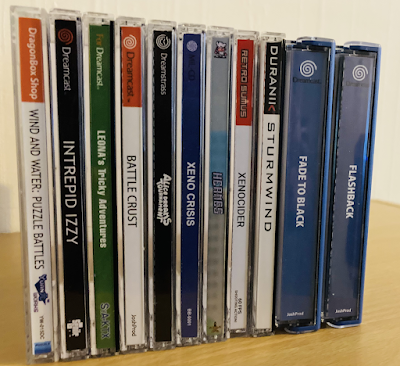The Kickstarter for Ross Kilgariff's 3D Dreamcast dungeon crawler HarleQuest! may have launched on April Fool's Day 2023, but it is quite clear from the community hype surrounding it that it is definitely no joke. Back in January, we asked Junkyard readers to tell us their most anticipated indie release as part of our Top 25 Dreamcast Indie Games poll, and HarleQuest! won out unanimously, receiving 80% of the total vote.
As the release of HarleQuest! draws closer, and our mitts frankly perspire at the prospect of getting a physical CD copy of the game in them, the universe (or rather, Ross!) has thrown us a curveball with regards to how the publishing of the game will now be handled.
Originally WAVE Game Studios were announced to be producing all the physical versions of HarleQuest!, but Ross has now chosen to self-publish the game through his brand new indie development and publishing studio, Orc Face Games. On Twitter, the brand new Orc Face Games account tweeted the following:
"Hi everyone! With the recent decision to self-publish HarleQuest! for the SEGA Dreamcast, we have started Orc Face Games - a new development and publishing studio! Stay tuned for a video announcement next week, along with the results of our recent Dreamcast indie game survey."
The survey that Ross is referring to in this tweet is one he put out at the beginning of the month, which asked a variety of questions that aimed to "gain a better understanding of the people who play independently made Dreamcast games in 2024". It's a great sign that Ross has looked to the community for feedback when setting up this new studio, and I'll be intrigued to find out what the consensus is from those who voted in the video he'll be putting out next week on his YouTube channel.
We reached out to Ross to get the scoop on everything Orc Face Games…
DCJY: Great to chat to you once again, Ross, and congratulations on the new venture! What can the Dreamcast community expect from Orc Face Games going forward?
Ross: As a publisher, our top priority is to build trust with developers. We live in the indie/homebrew community daily and want to do our part to help developers actually get things over the line into a polished physical release at a reasonable cost. A little down the road we will offer help with every aspect of development including funding, our 3D engine + tools, creative (art, music, sound, branding), porting... but for now we're looking to team up with developers who have an existing game or demo in the works and want to get the physical version made and into players' hands. In any case, if you're a developer at any stage, please reach out to us! We'd love to hear from you even if it's just for a chat!
That sounds great. Obviously HarleQuest! will be the first release from Orc Face Games, but do you have any plans for future titles that you can let us in on?
There is a concrete plan for what's happening after HarleQuest! and it involves a full 3D remake of an indie Megadrive/Genesis game for the Dreamcast. We know exactly what that's going to look like and it's going to be insane! After that, we will be starting a larger project again with a new IP which is still in the early stages, but it'll be bigger than HarleQuest! - that's all I'll say on that for now! As a developer, our focus is finishing HarleQuest! and making it the best game possible.
We’re certainly excited to get our hands on HarleQuest!. For those who missed the Kickstarter, where can they pre-order a copy?
HarleQuest! pre-orders are now up on the Orc Face website for anyone who missed the Kickstarter! The site is still pretty simple but it works. We'll spruce it up a little before the HarleQuest! launch. In the meantime, you can visit [the Orc Face Games website] to pre-order the game in your preferred region style.
***
I look forward to seeing Orc Face develop into the next big-deal Dreamcast indie publisher. With an experienced developer like Ross at the helm, passionate developers could really get the help they need to help get their games pushed out to the community at large. With that in mind, I wish Ross the best of luck with this new studio. You can follow both him and Orc Face on Twitter for updates.
Are you excited to see what the future holds for Orc Face Games? Let us know in the comments below, or on any of our usual social media hangouts.














